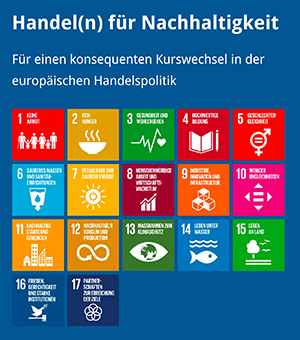Date: Tuesday, 23 November 2021
Time: 4.30–6.00pm (CET)
At the eve of 12th Ministerial Conference of the World Trade Organisation, Jeronim Capaldo will present the reform proposals he co-authored for the United Nations Conference on Trade and Development (UNCTAD). Deborah James and Sanya Reid Smith will share with us the demands for change articulated by the large civil society network Our World Is Not For Sale (OWINS). Helmut Scholz, Member of the European Parliament in THE LEFT group, will comment on what is at stake, before he travels to Geneva as a member of Parliament’s delegation to MC12. Will he witness an atmosphere of change inspired by the WTO’s new and energetic first-time female and first-time African Director-General Dr. Ngozi Okonjo-Iweala?
This Zoom event with simultaneous translation into English and German.
Speakers:
- Jeronim Capaldo (Director, senior economist and economist in the Division of Globalization and Development Strategies of UNCTAD)
- Deborah James (Director of International Affairs at CEPR, Coordinator of OWINFS (Our world is not for sale)
- Sanya Reid Smith (Third World Network, TWN, OWINS)
- Helmut Scholz (Member of the European Parliament, Committee on International Trade)
Moderation: Arif Rüzgar (Rosa-Luxemburg-Stiftung Brussels Office)
Since the creation of the World Trade Organization (WTO) in 1995, it has worked to keep up and develop international trade. As a large international economic organization, it has strong impact and control over international trade agreements and rules, but it has also the ability to affect a country's economy and its political decisional sovereignty. Yet several criticisms of the WTO have arisen from various levels, including NGO`s, civil society and economists. On the one hand, there are different issues at the organizational level: the dispute settlement (ISDS) is criticized of being non-transparent, that the WTO lacks a common sense of purpose and it has not adapted to the changes, which have shaped the global economy over the last decades, such as the climate crises or digital transformation. Furthermore, the WTO does still not recognize the core labour standards of the International Labour Organization (ILO) and human rights. The Covid-19 crisis has added another dimension to this crisis. While the developed counties have faced a strong recovery in 2021, the developing countries are still suffering and the exports of many of the smaller and poorer countries remain well below pre-pandemic levels.
On the other hand, there are issues on the content level. The WTO recommends that adopting policies to increase competitiveness, reducing fiscal policy and state subsidies, adopting further reductions in tariffs and non-tariff barriers, liberalization of services will lead to a better economic performance. These policy advices are not delivering tangible results for developing countries. Therefore, the WTO has been criticized for being unfair and ignoring the needs of developing countries.
In a research paper of the UNCTAD, the authors see the necessity and the possibility of a reform of the WTO to solve the difficulties and the disparity between industrialized and developing countries and thus promote a fairer world trade, which is also to the advantage of the developing countries. “The WTO reforms should aim at restoring the trust in the trading system with a commitment to special and differential treatment as a prerequisite for ensuring a fair outcome.” (Davies/Kozul-Wright/Banga/Capaldo/Gallogly-Swan).
In this webinar, we will discuss the issues of the WTO and thus also consider whether the WTO makes sense and, if so, in what form and what content it can be reformed to ensure fair trade between different countries at different stages of development and to implement the socio-ecological transformation that is urgently needed in the face of various environmental and social crises.
We are looking forward to dicussing with you!









